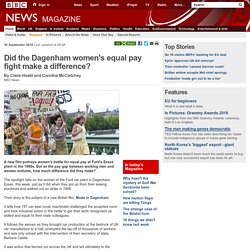

Women's Liberation Movement. Dagenham sewing machinists recall strike that changed women's lives. For Vera Sime, a former sewing machinist at Ford's Dagenham plant in the 1960s, one of the epochal days in modern industrial history started like any other.

"It was like a normal work day in that I got the children ready and gave them to my sister. Then we all met at the factory and got on the coach. " Along with scores of female colleagues infuriated by a pay structure that blatantly favoured male workers, Vera travelled to the streets of Whitehall on 28 June 1968 where employees brandished a famous banner. It read: "We want sex". Twenty-first century prejudices make it tempting to jump to conclusions about that image, but these were hardly women playing up to some hackneyed Essex stereotype. A mammoth meeting that day between eight strike leaders and Barbara Castle, who was then employment secretary, brokered a deal to end their three-week strike, which resulted in the women agreeing to return to work and the conception of the 1970 Equal Pay Act. Ford management was apoplectic. The women's liberalisation movement. How the contraceptive pill changed Britain.
The contraceptive pill has been called the greatest scientific invention of the 20th Century by some commentators.

Arriving at a moment of social and political upheaval, it is now 50 years since it was made available on the NHS. But what impact has this tiny pill really had? In 1961, women's lives were very different. Often married at an early age, most women were expected to stay at home and raise an expanding family while men went out to work. Nowadays, women can choose to have children, further education and a career on their own terms. The pill was instrumental in changing that. "I don't think people thought it would be as revolutionary as it was," says Dame Valerie Beral, a professor of epidemiology at Oxford University, who has spent the last 40 years researching the pill. Fifty years of the Pill: One woman's personal memoir of the Pill's dangers, both medical and moral. By Jenni Murray Updated: 09:29 GMT, 6 May 2010 October 1968 and an 18-year-old student is beginning to settle into her first term at university.

It's her first taste of freedom away from the watchful eyes of strict parents and grandparents. The sexual revolution - that heady period that to her contemporaries had meant 'nice girls did, if they felt like it' - had been far from an option for the only daughter in a family where nice girls absolutely didn't. Now was her chance. She, of course, was me. Swinging Sixties: As an 18-year-old, Jenni Murray bought a fake wedding ring in order to access the Pill Swinging was the way the Sixties is remembered, and it may well have been OK to tune in, turn on and drop out in a flower power frock if you lived in London and frequented Carnaby Street, but for most of us in the provinces it was a hard slog to get GCEs and A-levels and perhaps be the first in your family to get to university.
Becoming an unmarried mother was an unforgivable sin. Did the Dagenham women's equal pay fight make a difference? 30 September 2010Last updated at 05:45 By Claire Heald and Caroline McClatchey BBC News A new film portrays women's battle for equal pay at Ford's Essex plant in the 1960s.

But as the pay gap between working men and women endures, how much difference did they make? The spotlight falls on the women of the Ford car plant in Dagenham, Essex, this week, just as it did when they got up from their sewing machines and walked out on strike in 1968. Their story is the subject of a new British film, Made in Dagenham. It tells how 187 car-seat cover machinists challenged the accepted norm and took industrial action in the battle to get their work recognised as skilled and equal to their male colleagues.
It follows the women as they brought car production at the bedrock of UK car manufacture to a halt, prompted the lay-off of thousands of workers and was only solved with the intervention of then secretary of state, Barbara Castle. What Germaine Greer and The Female Eunuch mean to me. Helen Lewis, deputy editor of the New Statesman Germaine Greer is feminism's arsonist.

Unlike with, say, Andrea Dworkin or Kimberlé Crenshaw, there isn't one particular topic or theory she will always be associated with. Her value to feminism is as a destructive force, tearing down stereotypes and smashing taboos. She is living testament to the idea that women don't have to do what has always been expected of them: be good girls, get married, have kids, be nice and shut up. As a public intellectual, she had self-confidence you could bounce rocks off. It has become fashionable to affect a faint embarrassment about Greer, like a batty great aunt who sits in the corner making disquieting remarks about the Germans. The 1970s needed a feminist like that. Today's feminists shouldn't airbrush her legacy into something we find more palatable – particularly when the movement still so often demands that its pioneers also be saints. Rosie Boycott, journalist and campaigner.
Timeline of the Women’s Liberation Movement.